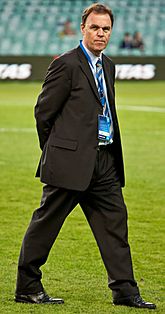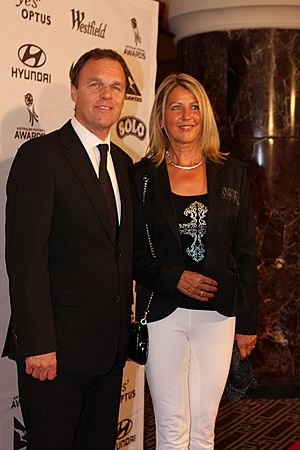Holger Osieck facts for kids
 |
||||||||||||||||||||||||||||
| Personal information | ||||||||||||||||||||||||||||
|---|---|---|---|---|---|---|---|---|---|---|---|---|---|---|---|---|---|---|---|---|---|---|---|---|---|---|---|---|
| Full name | Holger Osieck | |||||||||||||||||||||||||||
| Date of birth | 31 August 1948 | |||||||||||||||||||||||||||
| Place of birth | Duisburg, Allied-occupied Germany | |||||||||||||||||||||||||||
| Position(s) | Forward | |||||||||||||||||||||||||||
| Youth career | ||||||||||||||||||||||||||||
| 1958–1965 | FC Schalke 04 | |||||||||||||||||||||||||||
| Senior career* | ||||||||||||||||||||||||||||
| Years | Team | Apps | (Gls) | |||||||||||||||||||||||||
| 1965–1970 | Eintracht Gelsenkirchen | |||||||||||||||||||||||||||
| 1970–1972 | SSV Hagen | |||||||||||||||||||||||||||
| 1972–1976 | 1. FC Mülheim | 55 | (11) | |||||||||||||||||||||||||
| 1976 | 1. FC Bocholt | |||||||||||||||||||||||||||
| 1977 | Vancouver Whitecaps | 21 | (2) | |||||||||||||||||||||||||
| 1978 | Rot-Weiß Oberhausen | |||||||||||||||||||||||||||
| Managerial career | ||||||||||||||||||||||||||||
| 1978–1979 | Canada (assistant) | |||||||||||||||||||||||||||
| 1979–1987 | West Germany (youth) | |||||||||||||||||||||||||||
| 1987–1990 | West Germany (assistant) | |||||||||||||||||||||||||||
| 1990 | FC Schalke 04 (youth) | |||||||||||||||||||||||||||
| 1990–1991 | Olympique Marseille (assistant) | |||||||||||||||||||||||||||
| 1991–1992 | VfL Bochum | |||||||||||||||||||||||||||
| 1993–1994 | Fenerbahçe | |||||||||||||||||||||||||||
| 1995–1996 | Urawa Red Diamonds | |||||||||||||||||||||||||||
| 1997–1998 | Kocaelispor | |||||||||||||||||||||||||||
| 1998–2003 | Canada | |||||||||||||||||||||||||||
| 2007–2008 | Urawa Red Diamonds | |||||||||||||||||||||||||||
| 2010–2013 | Australia | |||||||||||||||||||||||||||
|
Medal record
|
||||||||||||||||||||||||||||
| *Club domestic league appearances and goals | ||||||||||||||||||||||||||||
Holger Osieck (born on August 31, 1948) is a German football manager. He is known for coaching several teams around the world. He was the manager of the Australian national team until 2013.
Before that, he coached the Urawa Red Diamonds in Japan. He helped them win the 2007 AFC Champions League. Holger Osieck was also an assistant coach for the West Germany national football team. They won the 1990 FIFA World Cup with his help. He also led the Canadian team to win the 2000 CONCACAF Gold Cup.
Contents
Playing Career
Holger Osieck played football in his home country, Germany. He played for several clubs like FC Schalke 04 and Eintracht Gelsenkirchen. He also played for 1. FC Mülheim and Rot-Weiß Oberhausen. However, he never played in the top German league, the Bundesliga.
Later in his playing career, he moved to Canada. There, he played for the Vancouver Whitecaps.
Managerial Career
Early Coaching Roles
After he stopped playing, Osieck became a coach. He worked as an assistant coach for the German national team. This was under the famous coach Franz Beckenbauer. They won the 1990 FIFA World Cup together.
After that, Osieck became a head coach for different clubs. He managed VfL Bochum in Germany. He also coached Fenerbahçe in Turkey. Then he moved to Japan to manage the Urawa Red Diamonds. He also coached Kocaelispor in Turkey.
Coaching VfL Bochum
Osieck started coaching VfL Bochum on July 1, 1991. His first game was a 2-2 draw. Bochum finished 15th in the league that season. They were knocked out of the German Cup early. Osieck left Bochum on November 2, 1992. The team was in last place when he left.
Coaching Fenerbahçe
Osieck became the manager of Fenerbahçe on July 1, 1993. In his first season, Fenerbahçe finished second in the league. They also reached the quarter-finals of the Turkish Cup. The next season, they played in the UEFA Cup. They were eliminated in the first round. Osieck left Fenerbahçe on December 18, 1994. The team was in fourth place when he departed.
Coaching Urawa Red Diamonds (First Time)
Osieck managed the Urawa Red Diamonds from January 1, 1995, to December 31, 1996. In 1995, the Red Diamonds finished third in the league. They also reached the quarter-finals of the Emperor's Cup. In 1996, they made it to the semi-finals of the Emperor's Cup.
Coaching Kocaelispor
Osieck coached Kocaelispor from January 1, 1997, to June 30, 1998. His first game was a 1-1 draw. Kocaelispor finished seventh in the league that season. They also won the Turkish Cup. In the 1997-98 season, Kocaelispor played in the Cup Winners' Cup. They were knocked out in the second round.
Canada and Second Time with Urawa Red Diamonds
Osieck became the manager of the Canadian national team in September 1998. His first game was a 1-1 draw against Northern Ireland. Canada won their first two games against Guatemala.
In 2000, Canada played in the World Cup qualifiers. They beat Cuba. However, they did not qualify for the World Cup. Under Osieck, Canada won the 2000 CONCACAF Gold Cup. They beat Colombia in the final. This earned them the nickname "Holger's Heroes."
In 2001, Canada played in the Confederations Cup. They lost to Japan and Cameroon. They drew 0-0 with Brazil. Canada finished last in their group. In 2002, Canada finished third in the Gold Cup. Osieck resigned in September 2003.
From 2004 to 2006, he worked for FIFA. In 2007, he returned to manage Urawa Red Diamonds. He led the club to win the 2007 AFC Champions League. Urawa also finished third in the 2007 FIFA Club World Cup. However, he was fired on March 16, 2008. This was after a difficult start to the 2008 season.
Coaching Australia
On August 11, 2010, Holger Osieck was named the head coach of the Australian national team. He replaced Pim Verbeek. His first game as Australia's coach was a 0-0 draw against Switzerland. His first win was a 2-1 victory against Poland.
In January 2011, he led Australia to the final of the AFC Asian Cup. They lost 1-0 to Japan in extra time. Australia only let in two goals during the whole tournament. Osieck was praised for this great performance. They beat defending champions Iraq in the quarter-finals. They also had an amazing 6-0 win over Uzbekistan in the semi-finals.
On March 30, 2011, Osieck led Australia to a surprising 2-1 win. They beat his home country, Germany, in a friendly match. Australia was missing their top scorer, Tim Cahill. Germany also played with a younger team. Australia was the only team to beat Germany at home or away in 2011. In 2011, Australia won 12 games, drew three, and lost two.
In 2013, during World Cup qualifying, Australia beat Saudi Arabia and Iraq. On June 18, 2013, Osieck made a tactical change. He substituted Tim Cahill during a World Cup Qualifier against Iraq. This decision was proven right when Joshua Kennedy scored the winning goal. This goal helped Australia qualify for their third straight World Cup.
However, on October 12, 2013, Osieck's contract was ended. This happened after Australia lost two friendly matches 6-0. They lost to Brazil and France.
Managerial Statistics
Holger Osieck coached many teams throughout his career. Here is a summary of his overall record as a manager:
| Team | From | To | Record | ||||||||
|---|---|---|---|---|---|---|---|---|---|---|---|
| M | W | D | L | GF | GA | GD | Win % | Ref. | |||
| Bochum | 1 July 1991 | 2 November 1992 | 53 | 12 | 17 | 24 | 27 | 79 | −52 | 22.64 | |
| Fenerbahçe | 1 July 1993 | 18 December 1994 | 53 | 33 | 10 | 10 | 121 | 57 | +64 | 62.26 | |
| Urawa Red Diamonds | 1 January 1995 | 31 December 1996 | 71 | 40 | 2 | 29 | 112 | 82 | +30 | 56.34 | |
| Kocaelispor | 1 January 1997 | 30 June 1998 | 67 | 23 | 21 | 23 | 80 | 76 | +4 | 34.33 | |
| Canada | 30 September 1998 | 2 September 2003 | 43 | 17 | 10 | 16 | 39 | 49 | −10 | 39.53 | |
| Urawa Red Diamonds | 1 January 2007 | 15 March 2008 | 53 | 26 | 18 | 9 | 80 | 52 | +28 | 49.06 | |
| Australia | 11 August 2010 | 12 October 2013 | 44 | 23 | 10 | 11 | 85 | 49 | +36 | 52.27 | |
| Total | 384 | 174 | 88 | 122 | 544 | 444 | +100 | 45.31 | — | ||
Honours
Holger Osieck achieved several honours during his managerial career:
Fenerbahçe
- TSYD Cup: 1994–95
Kocaelispor
- Turkish Cup: 1996–97
Urawa Red Diamonds
- AFC Champions League: 2007
Canada
- CONCACAF Gold Cup: 2000; 3rd place, 2002
Australia
- AFC Asian Cup: runner-up 2011
See also
 In Spanish: Holger Osieck para niños
In Spanish: Holger Osieck para niños


